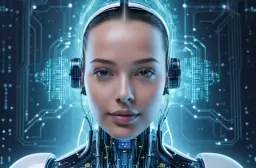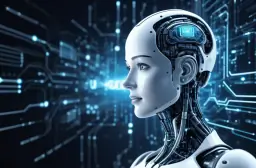AI in Education: Transforming Learning

Table of Contents
Is Artificial Intelligence the Key to Unlocking the Future of Education?
Imagine a classroom where every student receives personalised instruction tailored to their strengths, weaknesses, and learning pace. A world where teachers can focus on creativity and critical thinking while AI handles administrative tasks and lesson planning. This is not science fiction—it is the reality AI is bringing into education today.
For decades, traditional teaching methods have followed a one-size-fits-all approach, often leaving some students struggling while others remain unchallenged. But what if education could be as dynamic and adaptable as the students themselves? AI-powered education solutions are reshaping how we teach and learn, bridging gaps and enhancing accessibility like never before.
As artificial intelligence in academics continues to evolve, it is revolutionising the way students acquire knowledge and educators deliver lessons. From AI-driven learning benefits such as real-time feedback to personalised study plans, the technology is unlocking new possibilities for student success. But how exactly is AI transforming education, and what does it mean for the future of learning? Let’s explore.
The Role of AI in Modern Education

AI is no longer a futuristic concept—it is actively reshaping education today. Schools, universities, and online learning platforms are adopting AI-powered academic tools to streamline teaching and make learning more efficient.
One of the most significant AI advantages in education is adaptive learning. AI analyses student performance and adjusts lesson plans accordingly, ensuring that learners progress at their own pace. This personalised approach allows struggling students to receive extra support while advanced learners can explore more challenging material without being held back.
Additionally, AI-enhanced teaching methods assist educators in automating administrative tasks. Marking assignments, tracking student progress, and even generating lesson plans can be done with AI, giving teachers more time to focus on meaningful interactions with students. By reducing administrative workload, AI in digital classrooms enables educators to foster deeper engagement and creative problem-solving among students.
AI-Powered Learning Tools and Smart Classrooms
Smart learning with AI is transforming traditional classrooms into interactive digital environments. AI-powered education solutions such as virtual tutors, chatbots, and speech recognition tools help students grasp difficult concepts and receive instant assistance.
For instance, AI-driven platforms like intelligent tutoring systems use machine learning in education to identify gaps in student knowledge. These tools provide targeted recommendations, making learning more effective and tailored to individual needs. Similarly, AI-supported content creation tools generate interactive exercises, quizzes, and summaries, ensuring students remain engaged and motivated.
Moreover, AI in digital classrooms supports students with disabilities by offering speech-to-text, text-to-speech, and real-time language translation. These tools improve accessibility, allowing every student—regardless of learning differences—to receive an equitable education.
Personalised Learning with AI
Traditional education often struggles to cater to the diverse learning styles of students. AI-powered academic tools are changing this by customising learning experiences based on student preferences and abilities.
By analysing data on a student’s engagement, performance, and comprehension levels, AI creates unique learning pathways. Some students may benefit from video-based explanations, while others excel with interactive exercises or gamified learning. AI ensures that content is delivered in the most effective way for each individual.
Additionally, AI for student success is helping learners stay on track with automated reminders, study schedules, and progress tracking. Instead of relying solely on human instructors, students can receive 24/7 support from AI-driven study assistants, reinforcing learning beyond the classroom.
AI’s Impact on Educators
While AI is enhancing student experiences, it is also empowering teachers with data-driven insights. Educators can use AI-powered education solutions to monitor student engagement, detect learning gaps, and adjust teaching strategies accordingly.
For example, AI-driven analytics can highlight which topics students struggle with the most, allowing teachers to refine lesson plans. This data-driven approach ensures that students receive targeted support and that no learner is left behind.
Furthermore, AI enhances professional development by providing teachers with personalised recommendations for new teaching techniques and educational resources. By leveraging AI, educators can continually improve their methods and deliver more impactful lessons.
The Future of AI in Education
The future of AI-powered education solutions is filled with promise. As technology continues to advance, we can expect even more sophisticated AI-driven learning benefits, such as immersive virtual reality classrooms, AI-assisted career guidance, and automated essay grading powered by natural language processing.
However, challenges remain. Ethical concerns surrounding data privacy, AI bias, and the role of human educators must be carefully addressed. AI should be seen as a tool to enhance teaching, not replace human interaction. Maintaining a balance between technology and traditional pedagogy will be key to successfully integrating AI in academics.
As we embrace AI advantages in education, we must ensure that these innovations remain accessible and equitable for all students. The goal is not just to make education smarter, but to make it more inclusive, engaging, and effective for learners worldwide.
Conclusion
Artificial intelligence is transforming learning by making education more personalised, efficient, and accessible. From AI-driven learning benefits such as adaptive learning to AI-enhanced teaching methods that empower educators, the technology is revolutionising how knowledge is delivered.
As we continue to explore AI in digital classrooms and smart learning with AI, it is clear that the future of education is evolving. With the right balance of AI-powered academic tools and human guidance, we can create a world where every student has the opportunity to succeed.
The question now is not
Popular Tags
ADS SPACE HERE


